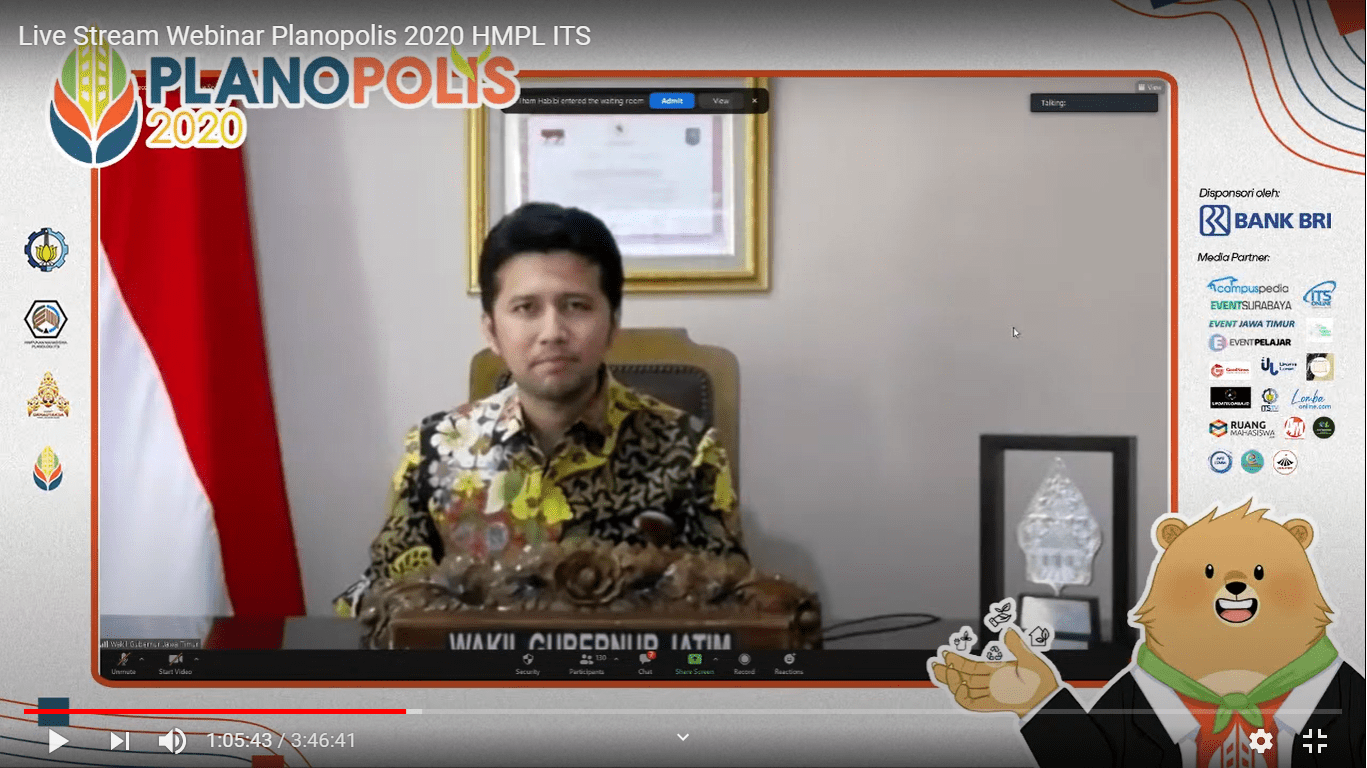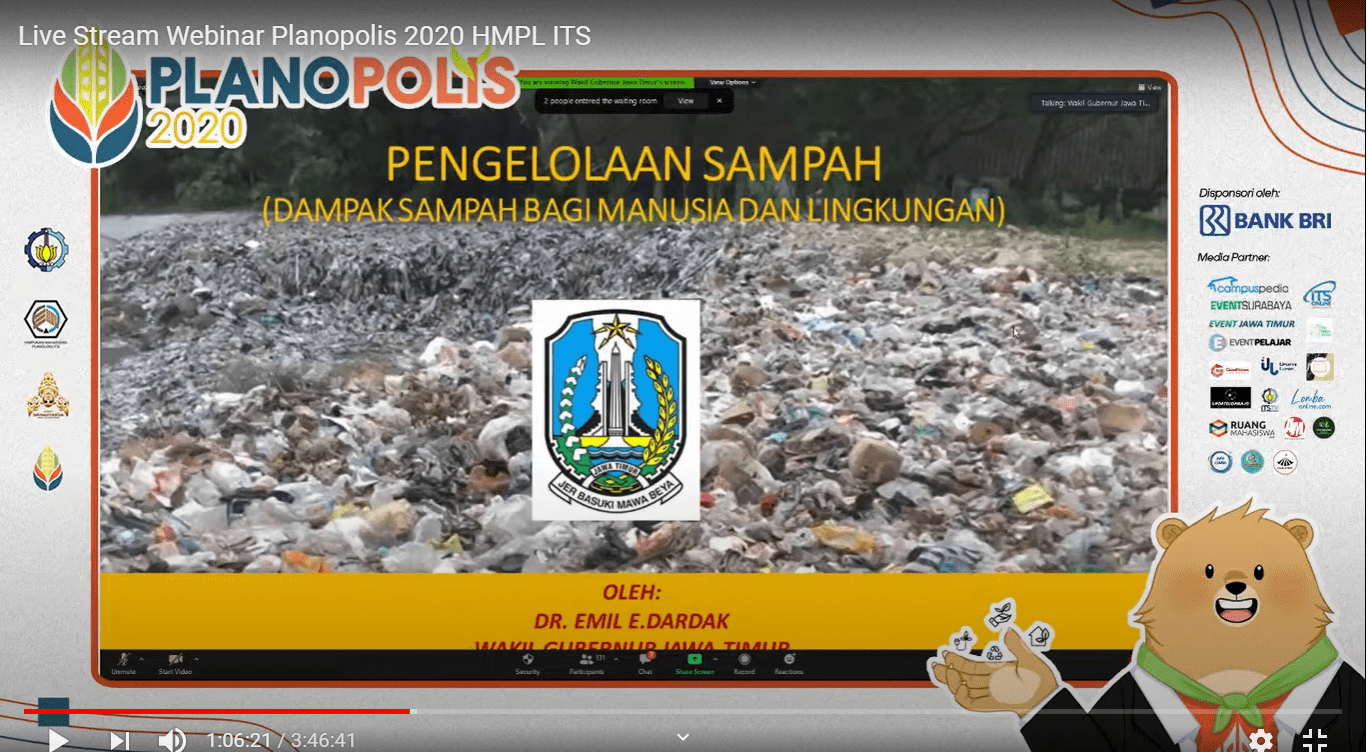The Importance of Waste Management Implementation in Urban Planning

Deputy Governor of East Java, Dr. H. Emil Elestianto Dardak B Bus M Sc when delivering his lecture on the importance of waste management in urban planning during the ITS Planopolis Webinar
ITS Campus, ITS News — Waste is definitely a hot issue in the urban planning sector. It is a known fact that waste management is urgently needed in order to actualize the formation of a green city. For this reason, the Department of Urban and Regional Planning of the Institut Teknologi Sepuluh Nopember (ITS) collaborated with the Deputy Governor of East Java to discuss the importance of waste management in urban planning.
Starting his lecture, the Deputy Governor of East Java, Dr. H Emil Elestianto Dardak B Bus M Sc, raised the point that waste processing cannot be separated from the process of planning an area. Moreover, with the development of the population and industry, the amount of waste will continue to increase significantly. “This waste management is a challenge for the government, which in its implementation requires interaction between all elements of society,” he stated.
Waste management has been stipulated in the Regulation of the Governor of East Java Number 106 of 218. It includes the law on waste management on land and sea as well. Starting from the implementation of the 3R (reuse, recycle, reduce), to the awarding of the Adipura trophy. “The law is a regulation to achieve public health and a good-quality environment,” continued the man who is familiarly called Emil.

Waste Management lecture by the Deputy Governor of East Java, Dr. H. Emil Elestianto Dardak B Bus M Sc, during the ITS Planopolis Webinar.
Emil added that other than what was stated in the East Java Governor’s Regulations, there are several waste management concepts that can directly be applied by the public. The first is zero waste. Zero waste or eliminating waste, emphasizes wise behavior in using single-use items to reduce the amount of waste. “Moreover, this concept tends to develop well, especially among young millennials,” he claimed.
The second concept that can be used is the technological approach. This concept includes the work of transporting and disposing of wastes effectively. The application can be done through the development of waste management technology. So, the application requires quite expensive costs. “An example of a country that is quite good at implementing this system is none other than Singapore,” identified this former Regent of Trenggalek.
In addition to the two concepts above, there is also the concept of a circular economy, a method that makes waste the driver of economic growth. According to him, this concept is ideal to be applied in developing countries that require economic growth. “The trick is to recycle waste into products worth selling,” informed this winner of the youngest Doctor of Development Economics in Japan from Ritsumeikan Asia Pacific University.
At the end of the lecture during the Planopolis webinar, it reminds us that there are many small things that can be done by all levels of society in order to minimize the amount of waste. “Like carrying a drinking bottle to reduce the use of single-use bottles, to bringing your own shopping bag,” he concluded. (sin/hen/ory)
Related News
-
Faithful in Times of Joy and Sorrow, Married Couple Graduate with Doctorates Together at ITS
ITS Campus, ITS News — As though guided by one heart and one soul, Dr Hanugra Aulia Sidharta ST
October 30, 2020 23:10 -
ITS Wins 2024 Project Implementation Award for Commitment to Gender Implementation
ITS Campus, ITS News —Not only technology-oriented, Institut Teknologi Sepuluh Nopember (ITS) also show its commitment to support gender
October 30, 2020 23:10 -
ITS Professor Researched the Role of Human Integration in Sustainable Architecture
ITS Campus, ITS News –The developing era has an impact on many aspects of life, including in the field
October 30, 2020 23:10 -
ITS Sends Off Group for Joint Homecoming to 64 Destination Areas
ITS Campus, ITS News — Approaching Eid al-Fitr, the Sepuluh Nopember Institute of Technology (ITS) is once again facilitating academics who want
October 30, 2020 23:10
